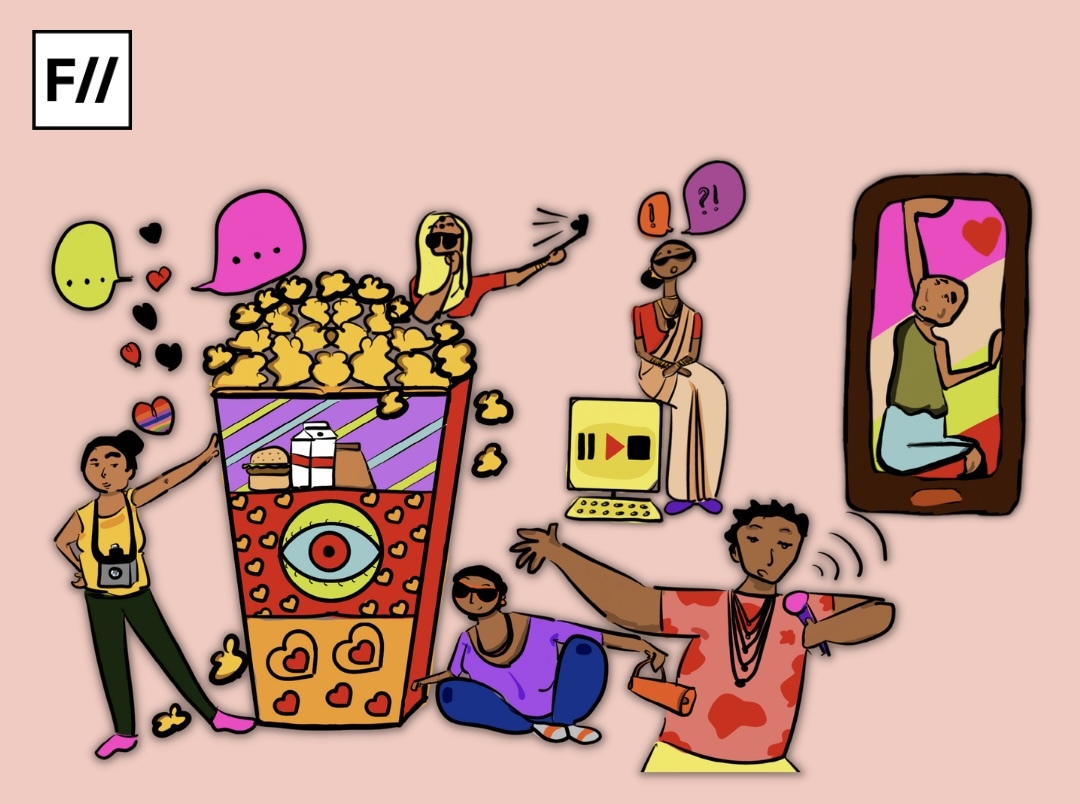Trigger warning: Stalking, sexual assault
Recently, a 23-year-old woman was abducted by a group of young men for allegedly rejecting one of the accused’s romantic advances. On 12th July 2022, Vigneshwaran, along with others, tried to kidnap the woman from her home in Mayiladuthurai, Chennai. However, she escaped and approached the police station for help.
The stalking began when Vigneshwaran befriended the woman and later expressed interest to marry her, which she refused. He was then taken to the police station on the complaint of stalking but was released after questioning and issuing a warning. Angered by this, he kidnapped the woman from her own house. with the help of 14 of his accomplices. The entire course of the abduction was captured on CCTV, where the family is seen screaming for help.
The word ‘stalking’ is quite well-known in India. It instills fear and uncertainty in the lives of the victims and completely disrupts their mental well-being. Stalking involves a pattern of exhibiting criminal behaviour that is disguised behind the seemingly innocent narrative of proposing love.
Stalking is regularly portrayed on screen as something that is normal and acceptable. It is a famous trope and has been a part of various hit movies. The pattern is quite similar in most of the films – A man proposes his love for a girl, the girl rejects him, and using the feeble excuse of believing in ‘true love’, the man stalks her and coerces her into a romantic relationship.
Stalking is a behaviour that is mostly a result of people not being taught how to cope with romantic rejection, and are used to getting what they want, especially those with gender and social privilege. Due to their normalised stalking tendencies, many victims’ behavioural reactions are severely triggered. Survivors avoid stepping out alone, are forced to alter their daily routines\, and give up many of their solo leisure and public activities when they are stalked
For example, in the movie, Raanjhanaa, starring Tamil superstar Dhanush, the stalker ruins the life of the victim because of his morbid infatuation, and eventually, both end up giving their own lives to prove their passionate love. The relentless nature of stalking on-screen dates back decades. Shammi Kapoor, famously known for his cheeky personality, would flirt, dance, and follow the heroine who rejected him, to find a way to change her mind.
The public’s responses to these films that perpetuate such stereotypes are alarming. The audience was elated when Raanjhanaa released and hyped up the movie for selfless love and rooted for these ‘heroes’. In the article India: Glorification Of Stalking In Bollywood, the author notes that the actor’s craft in portraying the stalker character in the film connects with the audience through the means of creating a deep sense of sympathy. The movie fails to address the fact that stalking is a purely criminal act.
These movies reinforce the problematic idea that resorting to substance abuse, stalking, and other criminal acts in response to romantic rejection is ‘normal behaviour’. They cement the thought that asserting male privilege and ownership of a woman’s autonomy and personhood is acceptable.
Also read: A Stalker Is Not Just An Individual But The Society Itself: How Well Do We Address Stalking?

Stalking is a behaviour that is mostly a result of people not being taught how to cope with romantic rejection, and are used to getting what they want, especially those with gender and social privilege. Due to their normalised stalking tendencies, many victims’ behavioural reactions are severely triggered. Survivors avoid stepping out alone, are forced to alter their daily routines\, and give up many of their solo leisure and public activities when they are stalked.
Similar cases have come to light where cishet men have taken ‘inspiration’ from Bollywood movies to stalk their love interests. Sandesh Baliga’s case is one such example. In 2015, an Indian man, Sandesh Baliga, was accused of stalking women in Tasmania, Australia. When questioned about his behaviour, he argued about believing in the typical Bollywood trope of patiently pursuing a woman until she falls in love.
He had also mentioned that he learned the ‘art of stalking’ from the character in the movie Darr, played by Shah Rukh Khan. The impact regional and national movies have on people is not restricted between lands, and shows how far-stretched these problematic tropes are in their impact.
These films show criminal acts as normal and fail to address the danger behind their popularisation. On May 11th 2022, a similar stalking case took place in Chennai. A bike taxi driver, Chanda Haasan, was arrested for stalking a 24-year-old woman for almost 10 minutes. With nowhere to go for help, the woman yelled at him, but as he rode away from her after trying to snatch her mobile, he screamed, “Yes, I will do this again,” reports The News Minute.

Stalking and the law
Crimes revolving around stalking and sexual harassment are reported every day in India. Although stalking as a behaviour is not overtly encouraged, it is being promoted as heroism in Indian movies. The relationship between cinema and culture is symbiotic. The arrogant movie star is a reflection of Indian men at large. The men in movies and real life have a high sense of entitlement, and believe to be the star or ‘saviour’ of the relationship, and that they have a say in women’s mental, social and personal needs.
Complaints against stalking can be made by lodging a complaint directly at the nearest police station. A written complaint against the stalker and complaints on Online Grievance Redressal forums are ways to report stalkers. A complaint can also be made at the National Commission for Women against stalking if the victim is not comfortable with direct police reporting. Social media websites like Instagram, Twitter, etc., provide options to report a profile, post, or any sort of dangerous online activity
Stalking is defined in the Indian Penal Code, under Section 354D[1]: Any man who —(i) follows a woman and contacts, or attempts to contact such woman to foster personal interaction repeatedly despite a clear indication of disinterest by such woman; or (ii) monitors the use by a woman of the internet, email or any other form of electronic communication, commits the offense of stalking
The impact of stalking on the victim is severe and there are various types of stalkers like rejected stalkers, resentful stalkers, heroic stalkers, and predatory stalkers. The victim is affected by psychological trauma and faces mental health issues that last for a long time. Drastic changes also ensue in the victim’s life where they change jobs or places. They are constantly on the alert and carry the weight of their emotional vulnerabilities for most of their life.

Stalking laws favour women because it is quite clear that stalking is done by men and it is a crime majorly against women and sexual minorities. Males are also victims of sexual harassment and stalking, but their stories are underreported and hence, no action has been taken.
Complaints against stalking can be made by lodging a complaint directly at the nearest police station. A written complaint against the stalker and complaints on Online Grievance Redressal forums are ways to report stalkers. A complaint can also be made at the National Commission for Women against stalking if the victim is not comfortable with direct police reporting. Social media websites like Instagram, Twitter, etc., provide options to report a profile, post, or any sort of dangerous online activity.
The Indian film industry is largely male-dominated, and the genre of stalking, romantic stories, and acts of heroism are also designed and executed by men. When women are popular, their interviews are always about their acting experience with famous male actors, or about acquiring information about the co-male actors.
Abduction, stalking, and coercion, are all criminal acts and must remain that way, even in the entertainment industry. Stalking is not ‘true love’, it is not heroic or romantic. Stalking is a criminal act.
Also read: Harassment In Films: Bollywood’s Constant Normalisation Of Toxicity As Love
Featured Illustration: Ritika Banerjee for Feminism In India
About the author(s)
Prathyusha [they/them] is a queer writer from Chennai. When they are not reading, they are either baking or buying books




